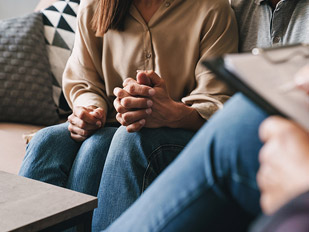The road to recovery from addiction is peppered with challenges and triggers that may push you towards a relapse if you attempt to stop without support. However, during rehab, you have already learned much of the coping mechanisms you need to achieve long-lasting recovery and remain sober.
Group therapy, in its various forms, is one of the best support mechanisms for people in recovery – it provides advice, monitoring, a shoulder to lean on and friends who understand.
This article explores the benefits of group therapy for addiction and how it can challenge and support you as you go through life’s ups and downs as shared experiences with other members within a group.

Group Therapy for Addiction
While a detox program can help you break your physical dependence on a substance or behavior, therapy is always required to address the underlying triggers that motivate your behavior. Group therapy is beneficial for the treatment of alcoholism and drug addiction and treating behavioral addictions (such as pornography, social media, gambling, and gaming) and eating disorders. In group therapy, the group is greater than the sum of its parts or individuals.
Group therapy is defined as when more than one patient is being treated by at least one trained leader or therapist at the same time. Having a substance addiction, a behavioral addiction, or an eating disorder is symptomatic of deeper underlying issues that need to be addressed.
A group therapy environment offers various benefits:

- The support of a peer group that is experiencing similar challenges to you. The group can support and challenge you through recovery
- A sense that you are not alone in your experiences
- Listening and supporting others through their experiences can give you different insights into your challenges when you start to look at them from someone else’s point of view
- A group space offers a safe and non-judgemental environment to experiment with new positive behaviors.
Group therapy also offers patients with alcohol and substance addictions the opportunity to re-socialize. For many recovering addicts, their interpersonal relations may have reduced to exist purely between their dealer and other users.
They may have broken down relationships with family members and friends they were once close to. The group environment offers a space to improve communication and rebuild relationships and provide a unique platform for family therapy treatments.
Types of Group Therapy for People with Addiction
Group therapy has demonstrated significant benefits for people in recovery when facilitated by a skilled therapist or trainer. Different group models may be used, depending on the group members, their recovery stage, and their goals.
Some of the commonly encountered types of groups include:
- Psychoeducational groups
- Skills development groups
- Cognitive-behavioral therapy or problem-solving groups
- Support groups
- Interpersonal process groups
Recovery is a process that takes place on a continuum, and your state of change will determine which group setting works best for your intended outcomes.
It’s essential and beneficial to be grouped with peers in the same state of change because your needs and priorities will be better aligned.
Different group therapy models have diverse objectives for the participants. For example, a psychoeducational group may highlight the impact of substance use, related behaviors, and consequences in a user’s daily life. The patient may then participate in a skills development group to develop the skills needed to prevent a relapse. A support group may help by showing group members how to relate to one another within the group setting. Alumni meetings offer important aftercare for people in recovery.
Do You Need Help?
We offer initial assessment and advice via phone or contact form.
Group v Individual Therapy
Specialists can combine different counseling therapies for long-term recovery from addiction. Both group sessions and individual treatment offer benefits to anyone recovering from addictive behaviors.
Individual therapy sessions merit the recovery process because they can help you develop self-awareness of the underlying triggers that contribute to cravings.
Group therapy delivers the positive reinforcement of a group of people in similar situations, as opposed to the viewpoint of a single therapist. In a group environment, your therapist or facilitator can observe how you relate to other members and thus has a broader scope of reference to relate to you.
Group Therapy v Support Groups
Support groups are a subtype of group therapy, but their focus is primarily on members receiving feedback and support from other participants to develop interpersonal skills. During treatment, your counselors can build support groups for all stages of recovery, not just for patients who are new to recovery, and members may join and exit a support group as they move through the different stages of recovery. In a support group, members typically discuss their day-to-day challenges and solutions and are held accountable by one another.
Many support and Self-Help groups incorporate 12-step programs seen in substance abuse recovery processes but may also include other tools and techniques such as relapse prevention. Joining a 12-step group is immensely beneficial for recovery from alcohol and drug addiction.
What remains important is to stay calm and focus on your recovery. Helping you on the way is our aftercare therapy, our Alumni network, and the efforts of different support and fellowship group which are spread throughout the state. In California, we have options for religious and non-religious, 12-step and alternative meetings, chapter meetings, and more. For additional information, you can ask your dedicated United Recovery team.
Benefits of Attending Group Meetings
While they may seem like a hassle or frightening experience, group meetings are actually beneficial for your recovery. Regardless of how unusual it may seem to open up in front of total strangers, it is the right way for many who battle addictions. Meeting like-minded personalities who share the process with you is indispensable when it comes to finding support and advice when you feel like you may be losing control.

- In group meetings, members are assured that they are not alone and that other people are experiencing similar challenges.
- Group meetings provide a bidirectional support system. Members can receive the therapeutic benefits of support and experience the learning and growth that accompanies providing support to others.
- Group meetings highlight and develop communication and social skills, as group members can express themselves and accept constructive criticism from others. Self-awareness can grow through the act of listening to other people.
- In a group setting, members can follow the successful behavioral models shown by others. It provides an environment that is conducive to learning and personal growth.
How to Successfully Utilize Feedback during Addiction Recovery?
Feedback is an essential component of successful group therapy because it provides a broader range of feedback than if you were in individual therapy. It also gives you more opportunities to learn and practice new skills. You may probably hear feedback that doesn’t resonate well with you.
It’s important to remember not to take feedback too personally, but this can be not easy if you are very sensitive or if you have been overly criticized. If you are too defensive, you are likely to miss out on some crucial insights into your life. Feeling hurt or defensive is valid, too, so don’t be afraid to share these feelings.
Try to acknowledge and appreciate the person who is giving you the feedback. Sometimes, it’s helpful to find out if the other members share the same sentiments in a group setting. If you aren’t getting any feedback, ask for it. If you can’t ask for it, try giving feedback yourself. Sometimes this can elicit feedback from others.

The Dos and Don’ts of Group Therapy
DOs
- Be as open as possible. Even though it might feel impossible to open up to the group, the more you share, the more you can be helped.
- Give feedback to others, but be sensitive about your approach. Be specific, but also be kind.
- Listen to others’ feedback.
DON’Ts
- Give advice, even if someone in the group actively shares a problem. A better strategy is to listen and ask questions. Try to understand rather than dish out advice.
- Over-prepare and rehearse, which can lead you to rely too much on stories that have the desired outcome. Rather than be authentic, be aware of the dynamics of the group and share accordingly.
Group Therapy – The United Recovery CA Approach
At United Recovery CA, we assess every client and their situation on admission. The ideal group environment for you will depend on your stages of treatment and the social skills and interpersonal skills you want to develop. Our substance abuse programs are tailored to the client’s needs and employ the principles of 12-step programs.
We consider all aspects of a patient’s health, self-awareness, and long-term recovery goals, for the best long-term results. At United Recovery CA, we know that a patient has the best chance of long-term recovery when supported and challenged by peers.
Meet your recovery team
Your recovery team consists of experienced, caring, and compassionate professionals who have many decades of experience in their respective fields. Our focus is on developing a safe and secure space for our patients to give and receive feedback, be supported, and learn the essential skills they need to build a productive life.









